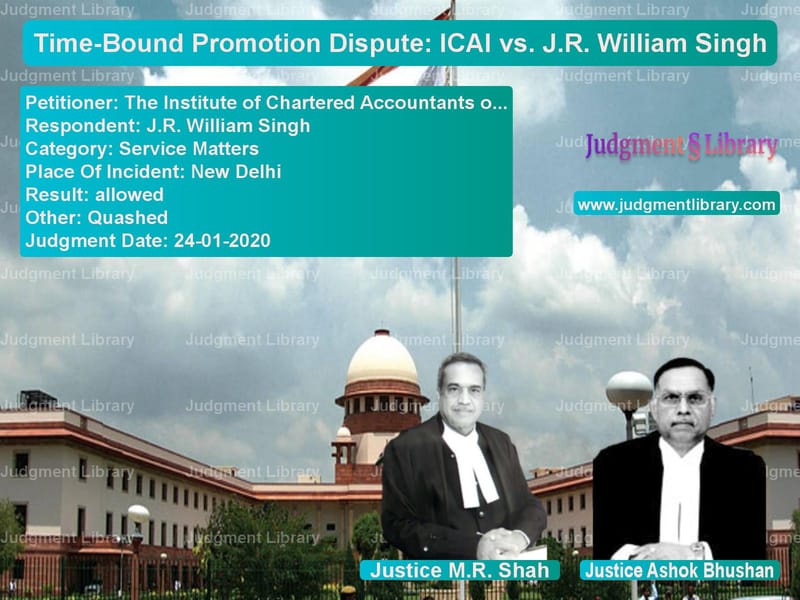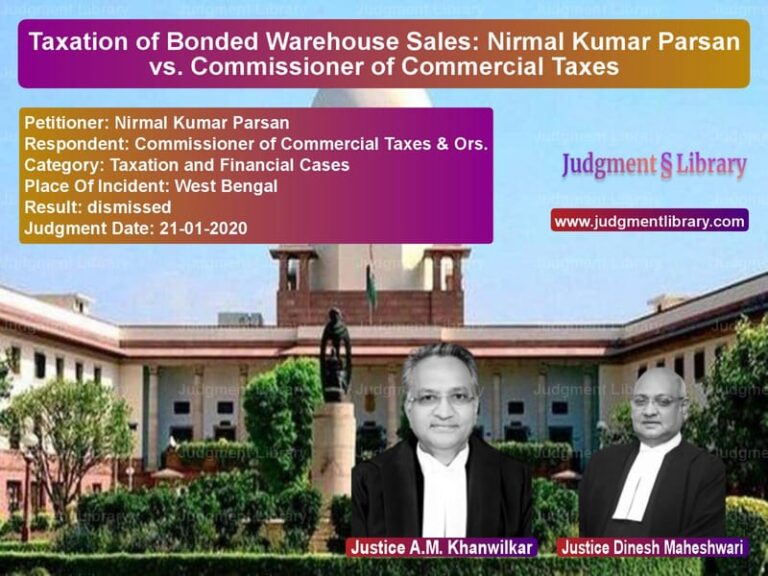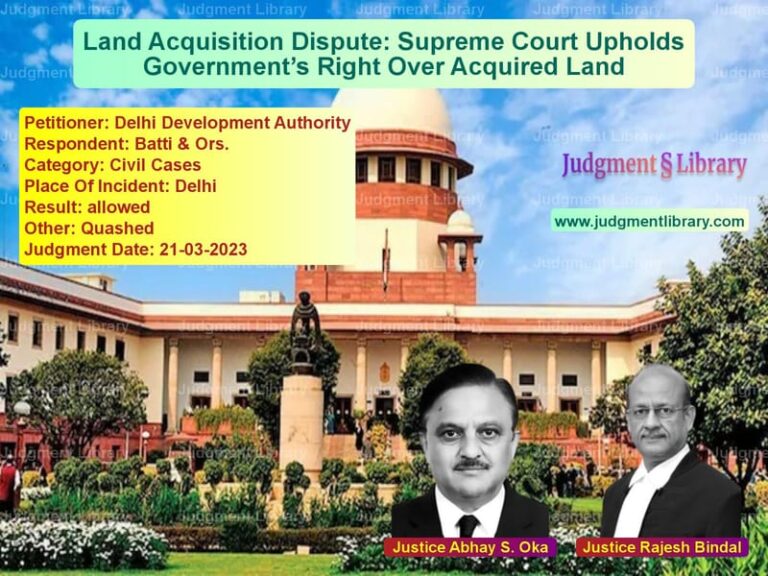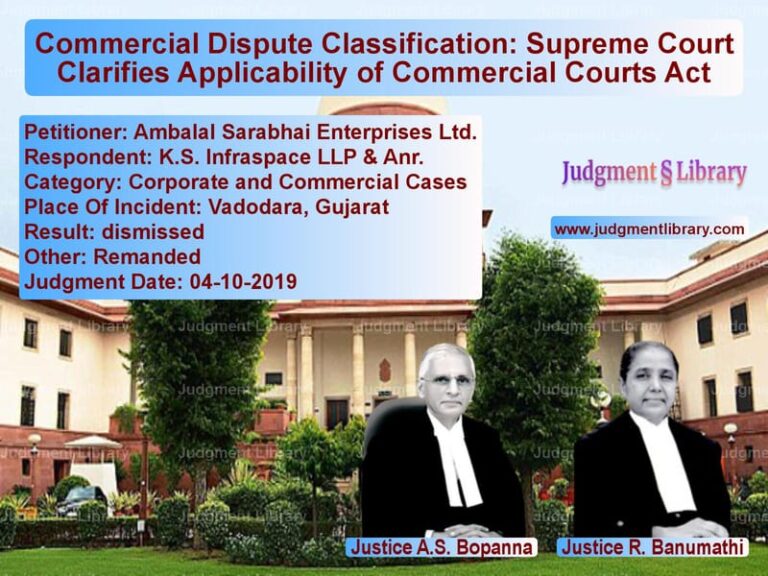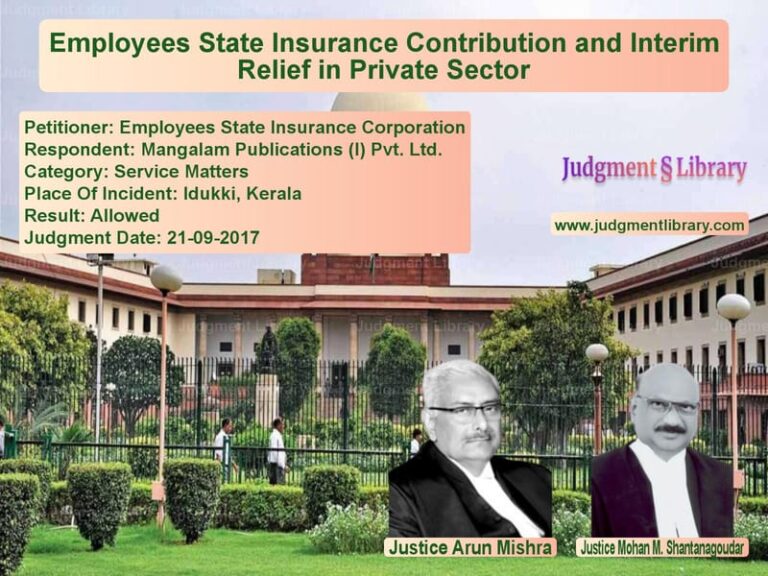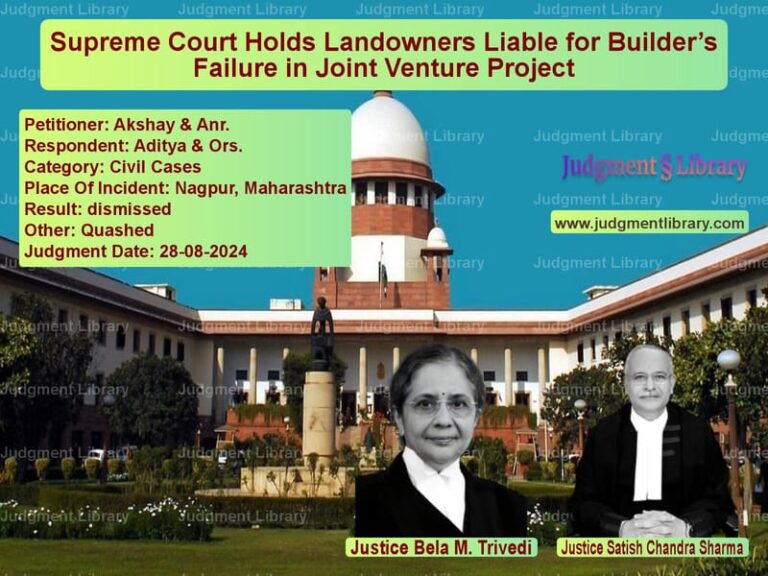Time-Bound Promotion Dispute: ICAI vs. J.R. William Singh
The case of The Institute of Chartered Accountants of India vs. J.R. William Singh revolves around the dispute regarding time-bound promotions under the Time-Bound Promotion Scheme (TBPS) for employees of ICAI. The Supreme Court had to determine whether an electrician working for ICAI was eligible for promotions under the TBPS despite earlier exclusions.
Background of the Case
The respondent, J.R. William Singh, was appointed as an Electrician at ICAI on February 26, 1974. Over the years, ICAI introduced the Time-Bound Promotion Scheme (TBPS) to facilitate promotions for employees who had completed a certain number of years in service.
On January 10, 1984, ICAI reached a settlement with its Employees’ Association, which provided time-bound promotions for employees in Class III and Class IV positions. However, under Clause 1(v) of this settlement, certain categories of employees, including electricians, were excluded from TBPS promotions.
Despite this, the respondent sought promotions under the TBPS, arguing that subsequent settlements in 1988 and 1991 did not explicitly exclude electricians. The ICAI rejected his request, stating that his position remained ineligible under the initial 1984 agreement.
The respondent approached the Delhi High Court, which ruled in his favor, directing ICAI to grant him time-bound promotions retroactively and award him the corresponding salary benefits. ICAI challenged this ruling before the Supreme Court.
Legal Issues and Proceedings
The key legal issues before the Supreme Court were:
- Whether the TBPS applied to the respondent despite his exclusion in the 1984 settlement.
- Whether subsequent settlements in 1988 and 1991 altered his eligibility.
- Whether the High Court erred in granting him retrospective promotions and salary arrears.
Arguments of the Appellant (ICAI)
ICAI presented the following arguments:
- The 1984 settlement expressly excluded electricians from the TBPS, and the decision was reaffirmed by ICAI’s President on February 25, 1984.
- Subsequent settlements in 1988 and 1991 only reduced the time gap for promotions but did not alter the exclusion of electricians.
- The High Court misinterpreted the agreements and wrongly assumed that the exclusion was no longer in effect.
- The respondent was never officially promoted to the position of Section Officer; he was merely assigned certain administrative duties.
Arguments of the Respondent (J.R. William Singh)
The respondent countered with the following arguments:
- The exclusion of electricians was not mentioned in the later settlements of 1988 and 1991, implying that the TBPS should apply to him.
- He had performed duties beyond his designated role, effectively working as a Section Officer.
- Since he had been placed in the Assistant’s pay scale in 1996, he was entitled to further promotion.
- Denying him TBPS benefits would amount to stagnation in service, which contradicts the intent of the scheme.
Key Observations of the Supreme Court
The Supreme Court analyzed the case based on:
- The legal validity of Clause 1(v) of the 1984 settlement.
- Whether later settlements modified the original exclusion.
- Whether retrospective promotions and salary arrears were justified.
After reviewing the case, the Court made the following findings:
- Clause 1(v) of the 1984 settlement remained binding and was not nullified by later settlements.
- The 1988 and 1991 settlements only reduced the waiting period for TBPS but did not expand its applicability.
- The High Court misinterpreted the agreements and erroneously granted retrospective promotions.
- The respondent had never been officially promoted to Section Officer, and mere assignment of duties did not entitle him to a promotion.
Verbatim Court Findings
The Supreme Court, while overturning the High Court’s decision, stated:
“The High Court has misread the 1988 and 1991 settlements. There was no alteration of the exclusion that had been explicitly outlined in Clause 1(v) of the 1984 settlement. The decision of the President of ICAI dated 25.02.1984 remains valid and binding.”
Additionally, the Court observed:
“Mere assignment of additional duties does not amount to a promotion. The respondent was never officially appointed as Section Officer, and hence, the High Court erred in granting him retrospective benefits.”
Final Judgment
The Supreme Court ruled in favor of ICAI and set aside the High Court’s ruling:
- The direction to promote the respondent was quashed.
- The salary arrears awarded by the High Court were denied.
- However, the Court ordered ICAI to pay the respondent the equivalent salary of a Section Officer for the period during which he was assigned such duties.
Final Verdict: Appeal allowed, High Court judgment set aside, limited salary benefits granted.
Petitioner Name: The Institute of Chartered Accountants of India.Respondent Name: J.R. William Singh.Judgment By: Justice M.R. Shah, Justice Ashok Bhushan.Place Of Incident: New Delhi.Judgment Date: 24-01-2020.
Don’t miss out on the full details! Download the complete judgment in PDF format below and gain valuable insights instantly!
Download Judgment: The Institute of Cha vs J.R. William Singh Supreme Court of India Judgment Dated 24-01-2020.pdf
Direct Downlaod Judgment: Direct downlaod this Judgment
See all petitions in Employment Disputes
See all petitions in Promotion Cases
See all petitions in Public Sector Employees
See all petitions in Judgment by Mukeshkumar Rasikbhai Shah
See all petitions in Judgment by Ashok Bhushan
See all petitions in allowed
See all petitions in Quashed
See all petitions in supreme court of India judgments January 2020
See all petitions in 2020 judgments
See all posts in Service Matters Category
See all allowed petitions in Service Matters Category
See all Dismissed petitions in Service Matters Category
See all partially allowed petitions in Service Matters Category

